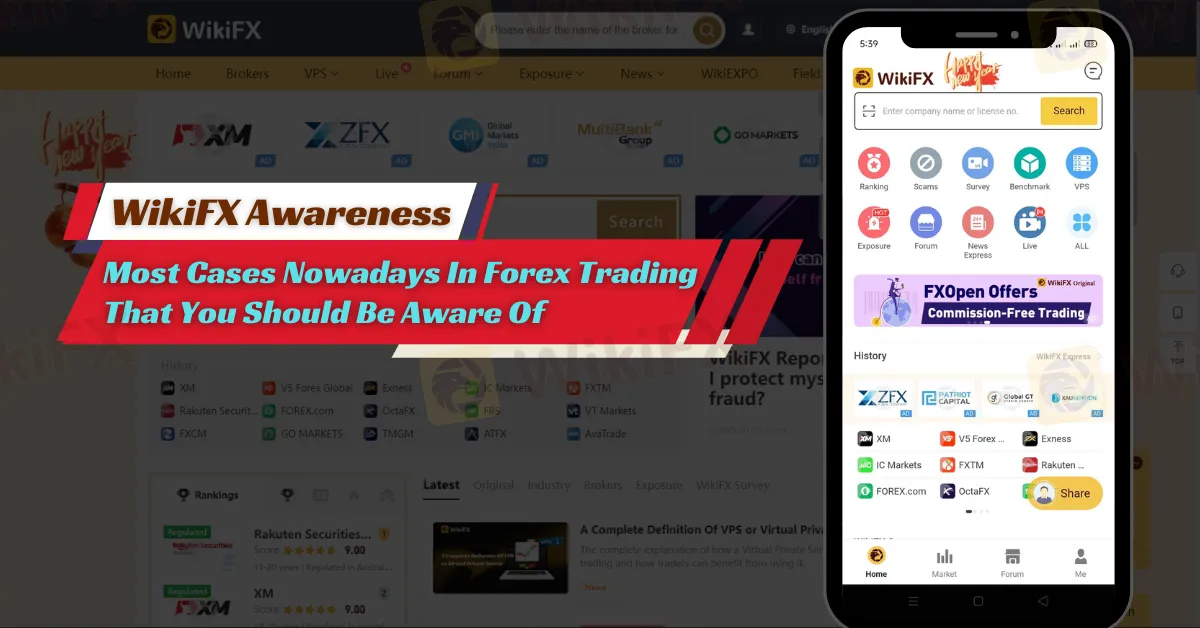简体中文
繁體中文
English
Pусский
日本語
ภาษาไทย
Tiếng Việt
Bahasa Indonesia
Español
हिन्दी
Filippiiniläinen
Français
Deutsch
Português
Türkçe
한국어
العربية
WikiFX Awareness: Most Cases Nowadays In Forex Trading That You Should Be Aware Of
Abstract:A brief explanation of unauthorized brokers who were warned by a certain regulatory authority that they would most likely resume operations under a different name.

Unauthorized brokers are individuals or companies that are not licensed or regulated by a regulatory authority. They may be operating illegally or may not have the proper credentials to provide financial services. A regulatory authority, such as the Securities and Exchange Commission (SEC), the Commodity Futures Trading Commission (CFTC), or the Financial Conduct Authority (FCA), may issue warnings or take action against these brokers to protect consumers from fraud or other financial harm. However, it is possible that these unauthorized brokers may continue to operate by using different names or by moving to different jurisdictions, making it difficult for consumers to identify and avoid them. It is important for individuals to conduct due diligence and research any potential broker or financial advisor before investing any money with them.
What are the most important things to do to prevent this from happening?
There are several important steps you can take to avoid falling victim to an unauthorized broker:
Verify the broker's credentials: Always check to see if a broker is registered and licensed with a regulatory authority. You can do this by checking the SEC's Investor.gov website or the National Futures Association's (NFA) Background Affiliation Status Information Center (BASIC).
Research the broker's background: Look for any red flags in the broker's background, such as a history of customer complaints or regulatory actions. You can also check the broker's record with the Financial Industry Regulatory Authority (FINRA) or the NFA.
Investigate the broker's references: Contact the broker's references and ask about their experiences. Be wary of any broker who is unwilling to provide references or who only provides you with positive testimonials.
Be skeptical of unsolicited offers: Be wary of unsolicited offers of investment opportunities, especially if they come from an unfamiliar source. These may be attempts to scam you out of your money.
Be cautious of high-pressure tactics: Be cautious of any broker who uses high-pressure tactics to persuade you to invest, such as insisting that you make a decision quickly or threatening that the opportunity will disappear if you don't act fast.
Avoid offshore brokerages: Be particularly careful of offshore brokerages, which may be operating outside of the jurisdiction of regulatory authorities.
By doing these things, you have a better chance of not getting scammed by an unlicensed broker.
Use the WikiFX App more frequently to avoid falling victim to fraudulent brokers, or contact the WikiFX Support team for assistance in locating a suitable broker.

Disclaimer:
The views in this article only represent the author's personal views, and do not constitute investment advice on this platform. This platform does not guarantee the accuracy, completeness and timeliness of the information in the article, and will not be liable for any loss caused by the use of or reliance on the information in the article.
Read more

The Dark Side of Trading Gurus: Are You Following a Fraud?
Across social media, YouTube, and countless online forums, self-proclaimed trading ‘gurus’ promise to share their winning strategies for a price. These so-called experts claim to have cracked the code, offering courses, investment tips, and mentorship schemes that guarantee success. However, in reality, many of them are little more than sophisticated scammers, preying on the financial aspirations of their followers.

INFINOX Partners with Acelerador Racing for Porsche Cup Brazil 2025
INFINOX has teamed up with Acelerador Racing, sponsoring an Acelerador Racing car in the Porsche Cup Brazil 2025. This partnership shows INFINOX’s strong support for motorsports, adding to its current sponsorship of the BWT Alpine F1 Team.

The Daily Habits of a Profitable Trader
Every professional trader follows a structured approach to ensure they are well-prepared, disciplined, and able to seize opportunities with confidence. Whether you are a seasoned investor or an aspiring trader, adhering to a robust daily checklist can significantly enhance your performance. Use this checklist to check if you are a qualified trader

Authorities Alert: MAS Impersonation Scam Hits Singapore
MAS scam alert: Scammers impersonate officials, causing $614K losses in Singapore since March 2025. Learn how to spot and avoid this impersonation scam.
WikiFX Broker
Latest News
TradingView Brings Live Market Charts to Telegram Users with New Mini App
Trump tariffs: How will India navigate a world on the brink of a trade war?
Interactive Brokers Launches Forecast Contracts in Canada for Market Predictions
Authorities Alert: MAS Impersonation Scam Hits Singapore
Stocks fall again as Trump tariff jitters continue
INFINOX Partners with Acelerador Racing for Porsche Cup Brazil 2025
Regulatory Failures Lead to $150,000 Fine for Thurston Springer
April Forex Trends: EUR/USD, GBP/USD, USD/JPY, AUD/USD, USD/CAD Insights
March Oil Production Declines: How Is the Market Reacting?
Georgia Man Charged in Danbury Kidnapping and Crypto Extortion Plot
Currency Calculator







